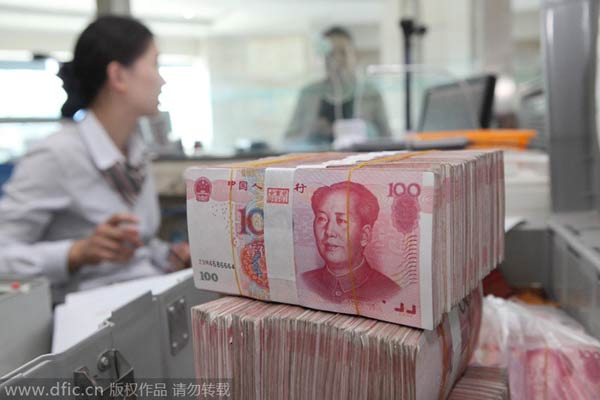Renminbi's depreciation unlikely despite recent slide
(chinadaily.com.cn) Updated: 2014-11-25 11:09
 |
|
An employee counts renminbi (yuan) banknotes at a bank in Lianyungang city, East China's Jiangsu province, June 4, 2014.[Photo/IC] |
Renminbi slid the most in two months and lost nearly 200 basis points versus the US dollar on Monday, after China's central bank unexpectedly cut interest rates during the weekend.
Liang Hong, chief economist of China International Capital Corp, said in a report that it's very unlikely that the Chinese regulators will depreciate renminbi, as a weakened currency might increase trade friction and trigger capital outflow, and the internationalization of renminbi would want its value to remain stable.
Lowered interest rate is expected to stimulate domestic demand, added Liang.
The People's Bank of China announced on Friday that it was cutting one-year benchmark lending rate by 40 basis points to 5.6 percent and one-year deposit rate by 25 basis points to 2.75 percent, signaling the first rate cut since July 2012 in an effort to prop up growth as the economy continues to slow.
Chinese stocks rallied to a three-year high on Monday with Shanghai Composite Index up 1.9 percent, while renminbi declined by the most since September.
"Current policy adjustments by all nations are primarily targeted at supporting domestic economic growth. There isn't much willingness to raise a currency war," said Zhuang Jian, China-based senior economist of Asian Development Bank, to China Business Daily.
Zhuang added that China's rate cut is to support economic structural reforms as well and shouldn't be overly interpreted.
- Cash crunch fans expectation on RRR cut
- US extends antidumping duties on China's thermal paper
- Modern food van with ancient look in Shanghai
- China home prices continue to cool in November
- Asia's top 3 billionaires all Chinese
- Old investment remedy the treatment for China's "new normal"
- China's solar sector opposes US anti-dumping ruling
- BMW to recall 846 cars in China
















